1814-th: on the way to Paris. Napoleon again let the marshals
He became Bonaparte again
12 failures by Napoleon Bonaparte. Opening the campaign of the 1814 of the year, the 44-year-old emperor was by no means proposing to the 56-year-old Marshal Augereau, his old comrade, “try on the boots of the 1796 of the year”. In the French campaign, he himself seemed to have returned to the era of revolutionary wars, crushing the allied corps and armies in the battles that followed literally one after another. But the more terrible was the hangover.
The severe setback at Laon actually forced Napoleon to leave Blucher and try to strike at the Allied Main Army, which almost tripled his strength. As a result, almost immediately after Laon will be followed by another “almost rout” - in the battle of Arcy-sur-Ob - from the Allied Main Army. It will be the last for the emperor in the 1814 campaign of the year, before his first renunciation of the throne.
And in February 1814, after several rounds of talks in Chatillon failed, the Allied forces nevertheless moved on to more active action. But only the Silesian army, led by Field Marshal Blucher, tried to hook the French wherever possible, eventually scattering their forces throughout Champagne. This soon took advantage of Napoleon.
At the same time, the main army of Schwarzenberg, which really threatened Paris, continued its almost serene stay on the banks of the Seine. There was no talk of any accumulation of forces, although at the same time, the old regiments tested in battles from Spain continually pulled up to the French.
And not only. By the summer, Napoleon could well have used most of the 170 of thousands of young scripts, called up at the turn of the 1813 and 1814 years. Russian and Prussian historians unanimously condemn the Allied Commander-in-Chief Prince Schwarzenberg for inaction, but they forget the fact that even the Russian Emperor Alexander I did not rush him.
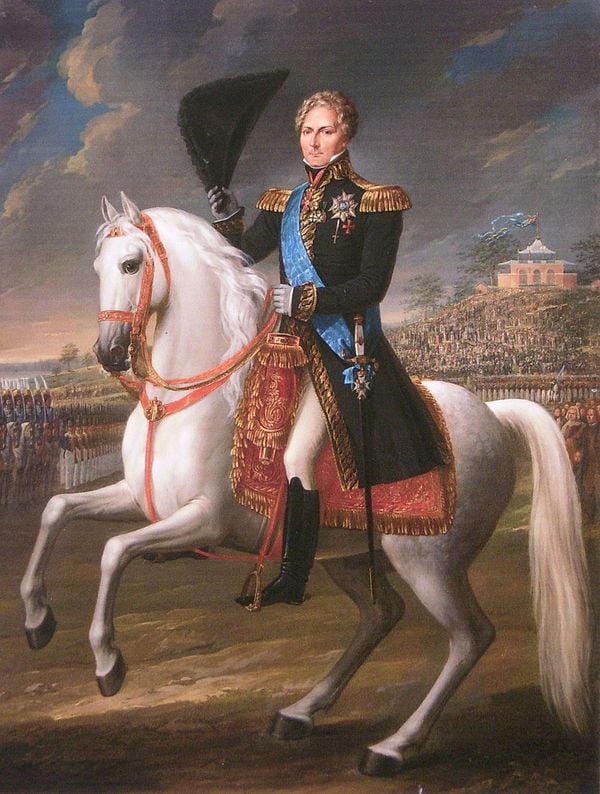
Among other things, the Allies counted on the fact that they would eventually join the Northern Army of Bernadotte. This former French marshal, who became the heir to the Swedish throne, very timely - on January 14 of 1814 of the year he seized Norway from Denmark under the Kiel Treaty.
It is significant that most of the participants in that campaign were much more tolerant of the Austrian field marshal, although many of them literally rushed into battle after the irrepressible Blucher. His Silesian army part of the forces managed to move north to meet the long-awaited reinforcements from the Swedish Crown Prince - the Russian corps of Wincingerode and the Prussian Bulow.
Upon learning of this, Napoleon immediately sent Kolencur an order to stop negotiations in Chatillon. More precisely, in his letter he talked about the fact that, for the sake of disguise, only interrupt the discussion of the conditions of the future world. He announced to one of the adjutants: “Now it’s not about peace. I will go to beat Blucher. ”
Bonaparte's Six Day War
Napoleon knew very well how things were going in the Main Army of the Allies, but left a very strong barrier against her - almost 40 thousand in the corps of Udino and Victor and young regiments. They were ordered to defend the crossings on the Seine "to the last extreme." Such rhetoric in the orders of the emperor was not very long ago.
With the 30-thousandth army, the emperor actually rushed after the outgoing columns of the Silesian army of Blucher. The old hussar hoped to cut off the retreat route from La Ferte-sous-Juard to Marshal MacDonald, who led the artillery park of the Napoleonic army to Mo. And at the same time he was waiting in Vertu for the approach of the buildings of Kleist and Kaptsevich.
Blucher was not worried about the left flank, believing that he was provided with the advance of the Main Army. Napoleon, with the corpses of Marmont, Ney and Mortier, the guards and most of the cavalry, quickly moved to Cezanne through Vilnox. The brilliant commander aimed to hit the very center of the scattered Silesian army.
The first blow fell on the 6-thousandth Russian building of Olsufiev, which was literally crushed in a battle near Champober. The general himself was captured. Upon learning that the main forces of Blucher were still at Vertu, the emperor left Marshal Marmont against him with the Lagrange division and Pear's cavalry against him.
Napoleon threw the main forces at Saken to Monmirai. The very next day, the entire French army hit the lone Russian corps. Saken's soldiers fought fiercely, but the only thing they managed to do was to lose 4 thousands of men and 9 guns and retreat to join the York Prussian corps, which was reaching for the Chateau Thierry.
At the Chateau-Thierry, the French again attacked the positions of the allies, lining up right in the open field. An attempt to resist Napoleon in an open battle cost the Russians and the Prussians three thousand killed, wounded and captured, as well as 6 guns. The enemy was driven back by Napoleon to Ulshi-le-Chateau on the road to Soissons. The French army was ready to finish off the corps of Saken and York, but Blucher prevented the persecution, which began to press Marmont. Marshal Mortier was thrown against the vanquished, and Napoleon with the main forces rushed to help Marmont.
At Woshan on 13 on February, Marshal Ney, together with the guard and cavalry of Lefebvre-Denuet, arranged for the Prussians a real trash. Blucher barely managed to break through the ranks of Pear's cavalry, leaving up to 6 thousands of weapons and one and a half dozen guns left at the scene of the battle and in the Etozh forest. As a result, the Silesian army, which had almost reached Mo, where the road to Paris opened, was swept away by Napoleon's blows in the space from Soissons to Chalon.
It turned out that there was no one to finish off for the emperor - the prey would be too small. The main forces of the French are deployed against the main army of Schwarzenberg. The Silesian army was saved from Mortier’s attacks by the Russian corps of Wincingerode coming from the north, whose vanguard under the command of General Chernyshev was unexpectedly captured by Soissons. From there, the remnants of the 7 thousandth garrison fled to Compiegne, and this enabled Blucher to connect with the broken corps of York and Saken. The Field Marshal immediately advanced the new forces to Wincingerode in Reims, the coronation capital of old France.
All this time the movement of the Main Army was extremely cautious, but it nevertheless approached Paris at four crossings, concentrating at Troyes. After a series of clashes, Victor and Oudinot took their corps to Nanjis, where they were joined by MacDonald, who returned from Mo. Despite the newly deteriorated weather, Napoleon with the main forces began a march towards Chalon, which the Allies immediately took for a general offensive.
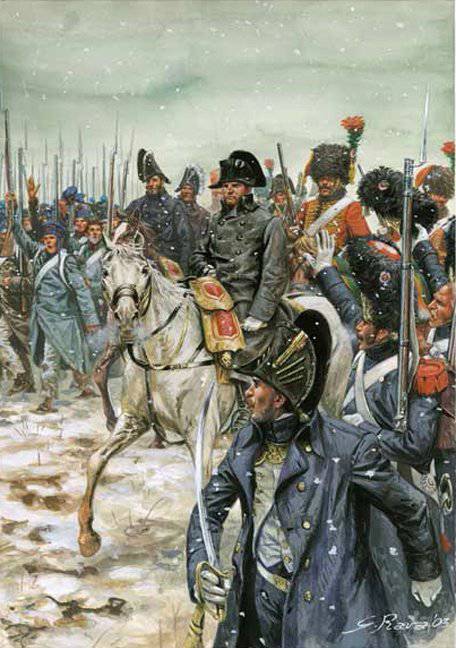
The main army moved towards Arsi-sur-Ob, as the Russian emperor was not without reason worried about its rear and right wing. Blucher's Silesian army, having lost up to a third of its forces, barely escaped complete defeat, but the allied monarchs and command finally reconciled with the thought that one could not even dream of peace with Napoleon.
Already in the XX century, many military historians with pleasure, for well-known reasons, began to call this victorious relay race of Napoleon a six-day war. Indeed, the six days of victories of the French emperor nearly brought the war to an end. The emperor himself rejected the very moderate peace offers of the allies. In some ways, his successes were explained by the inaction of Schwarzenberg, as well as by the three allied sovereigns, to whom the Austrian field marshal obeyed without question.
Attempt number two
Fear of Napoleon's army was still one of the most important factors in the war. For a while, having forgotten about Blucher, against which only Marmont and Mortier remained, the emperor already on 16 of February brought the army to Gin. He was joined by cavalry from Spain, tearing into battle, and to begin with, she scattered on the approaches to Provins the Russian avant-garde Palena with the loss of the last 9 guns and two thousand prisoners.
At this time, the three corps of the Allied Main Army still managed to be on the right bank of the Seine, which, however, immediately made them vulnerable to the main forces of Napoleon. He could well continue to push on the right flank of Schwarzenberg, but even the prospect of cutting off Blucher thereby did not seduce him.
The brilliant commander preferred to solve a more urgent task, he threw the corps of Eugene Wirtemberg from Montero and immediately forced the Allies to abandon all the crossings through the Seine. In this situation, Schwarzenberg's leisureliness fully paid off. He managed to pull the main forces to Troyes, not even hoping that Blucher would be able to join him.
However, the Prussian field marshal surprisingly quickly knocked back to 50 thousands of troops of the Silesian Army, with whom he joined the right flank of the Main Army. Even the abandoned corpses of Vorontsov and Stroganov seemed to completely manage to catch up with Reims near Wincingerode.
Napoleon was not in a hurry to attack the Main Army, hoping that the same Marshal Augereau from southern France would hit her in the rear, but the circumstances were different. At first, none other than the King of Neapolitan Murat decided to take the side of the Allies, which made the position of Augereau unpromising. The aging marshal also hesitated, not finding his "1796 boots of the year."
As a result, the battle of Troyes did not take place, despite the fact that Blucher's Silesian army was not able to cross the other side of the Seine, guarding communications with the rear and with the army of Bernadotte. In the event of a serious collision, in any case, she would have lost a day at the crossing, for which Napoleon had the right to expect to deal with Schwarzenberg.
First, the army of Schwarzenberg left for the Seine, which caused terrible discontent among the troops. The French almost did not pursue the allies, and the rearguard was insignificant. The allies even intended to retreat to the Rhine, and then started negotiations with Napoleon, but the French emperor flatly refused the adjutant of the Austrian commander.
Only on 23 of February did the French approach Troyes and without success tried to storm the fortress. By morning, the garrison left to join the main forces in Bar-sur-Aub, and a day later at the military council it was decided not to retreat, as Schwarzenberg demanded, and again to give Blücher complete freedom of action. Tom now had to reunite the Silesian army with the corps of Vorontsov, Bulow and Wincingerode, who were stuck on the Marne against Mortier and Marmont.
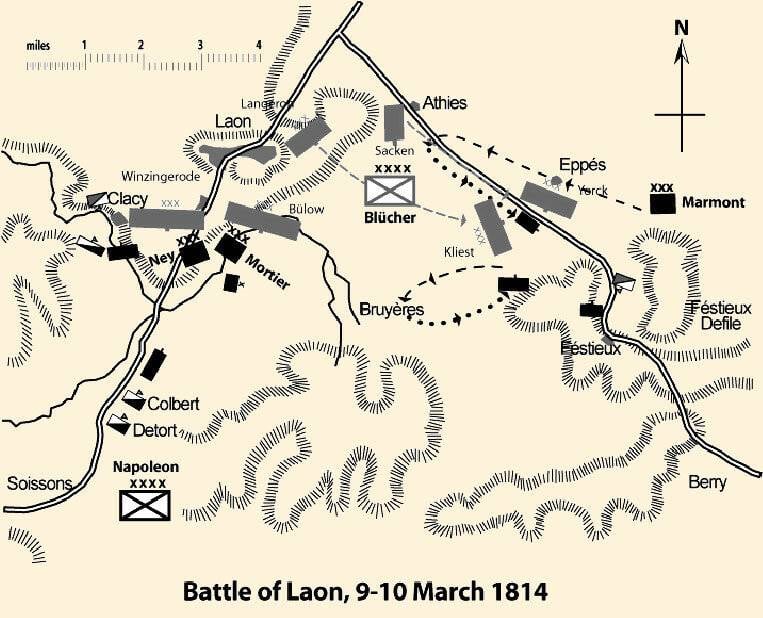
From Kraon to Laon
The main Allied army crawled to Chaumont and Langre, although it did not suffer a single serious defeat from Napoleon. And more than once the beaten old hussar Blucher actually again caused fire on himself. Even only his army was stronger than Napoleon's army, although they did not want to believe this in the union main apartment. But Blucher wanted to go straight to Paris.
In the last days of winter, separate corps of the Main Army defeated the Napoleonic Marshals Udino and MacDonald at Bar and La Ferte, and only after that they learned that Napoleon again chased after Blucher. He with 50 thousands in the buildings of York, Saken and Kleist immediately came out of Mary. The corps of Wincingerode and Bülow from the Northern Army were also heading for Paris - one through Reims, the other through Laon.
Blucher forced Mortier and Marmont to retreat to Moe, where the first clash occurred, which was heard in Paris from the roar of artillery cannonade. The Parisians from Napoleon’s bulletins believed the allies to retreat completely to the Rhine and the disappointment was simply terrible. On the shores of Urka, spare regiments, recruiting depots, and parts from personnel were immediately sent to the marshals from the capital.
Under Mau 1 in March, Field Marshal Blucher received reports of Napoleon's approach. His goal was achieved - the Main Army could advance again, and the old hussar with his army was moving away from the Paris suburbs. The next day, Napoleon from the high banks of the Marne already observed the rearguard columns of the Silesian army, but could not hit them yet. Crossings over the Marne were burned by Russian sappers.
The emperor hoped to catch up with the Russian-Prussian forces a little to the north - on the river En, the stone bridge over which was in the hands of the French in Soissons. Having lost hope that Augereau would help from the south, Napoleon decided, having defeated Blucher, to advance to Holland, for the deblockade of the numerous garrisons of the fortresses there, which could give him an additional almost 100 thousand.
The first blow of Napoleon came on March 7 in the corps of Vorontsov and Stroganov, who defended the Kraonsky heights with forces of 16 thousand. They could only delay the onset of the 40-thousandth mass of the French, all the more so because the roundabout maneuver of the cavalry undertaken by Blucher did not succeed due to the strong debauchery.
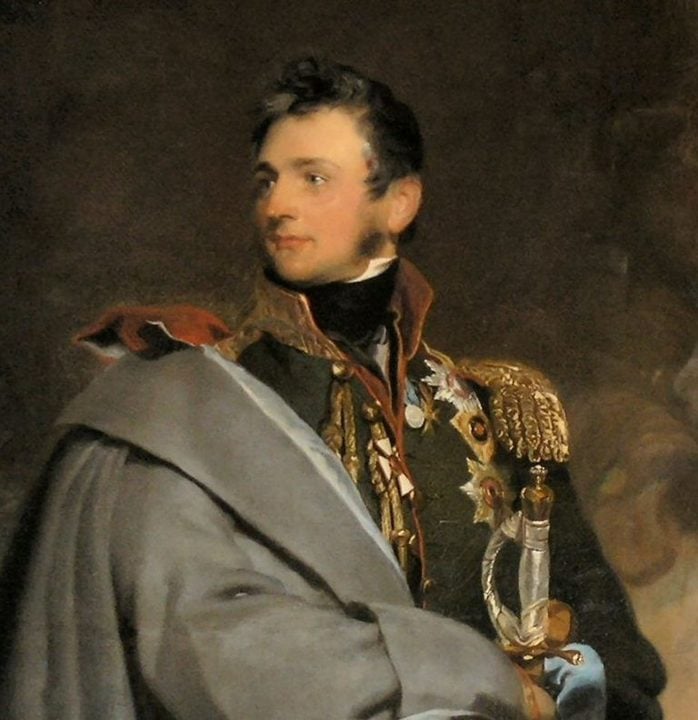
Unable to resist Kraon, Blucher, with the approach of the corps from the Northern Army, was able to draw to Laon more than 100 thousand troops with 260 guns. Napoleon, having only 52 thousands of soldiers with 180 guns, nevertheless decided to attack. But the Russian regiments survived the blow of the main French forces on the right flank, and on the left flank the allies' night counterattack took Marmont's corps by surprise.
His soldiers, settling down for the night, were ready, together with their emperor, to resume the battle the next morning. Despite the complete defeat of Marmont, the emperor did not stop the attack and only on the night of 11 of March retreated to the Seine. It was not possible to break through to the north, and from the south Schwarzenberg pressed again. Napoleon will still try to settle accounts with him at Arcy on the south bank of the Ob River, but this will be his last failure in the 1814 campaign of the year.
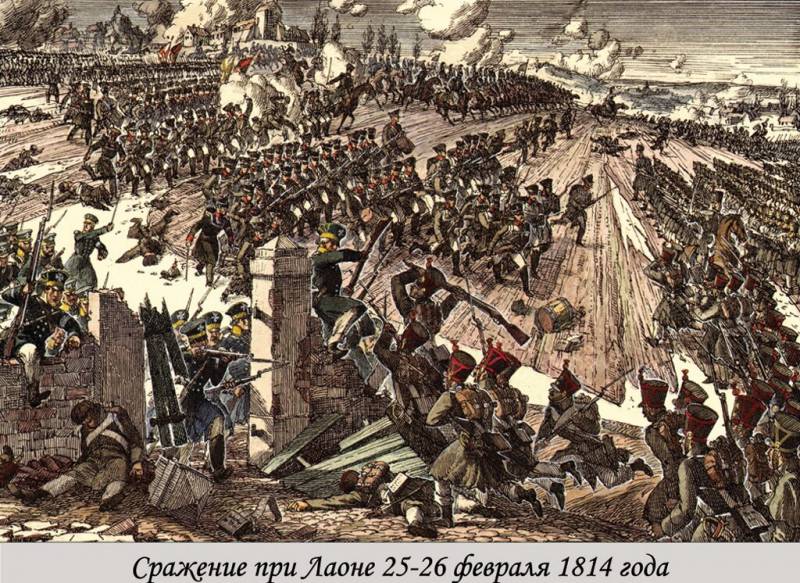
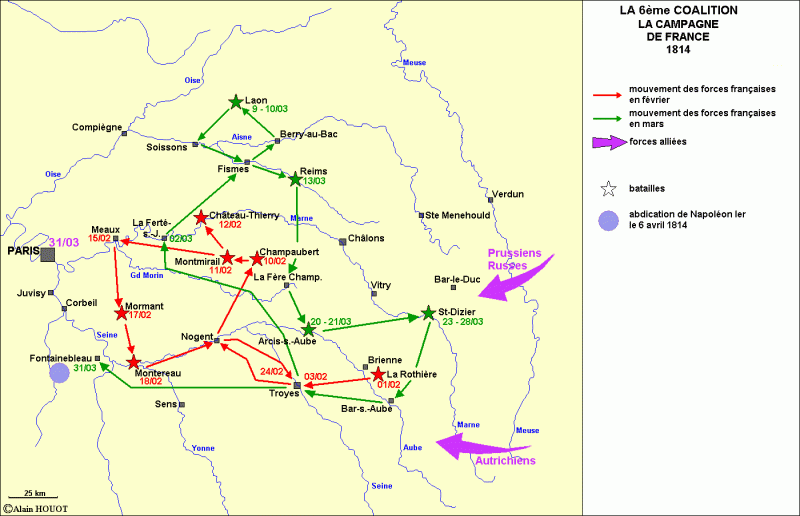
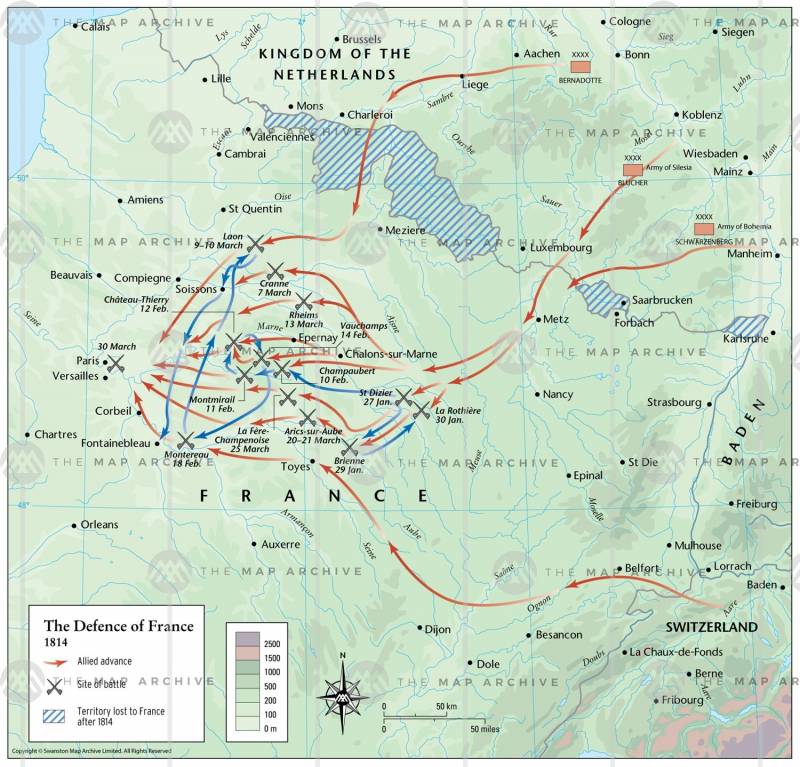
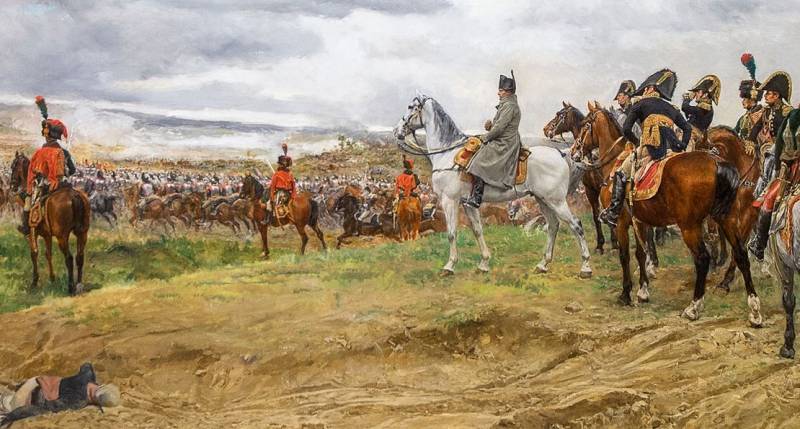
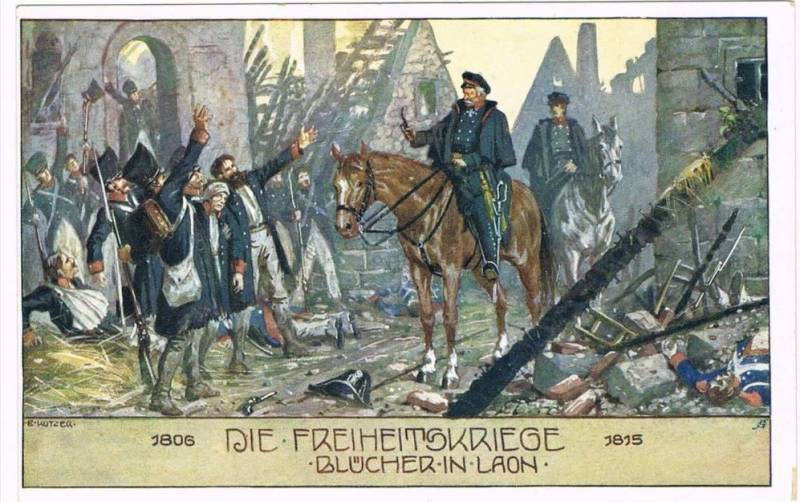
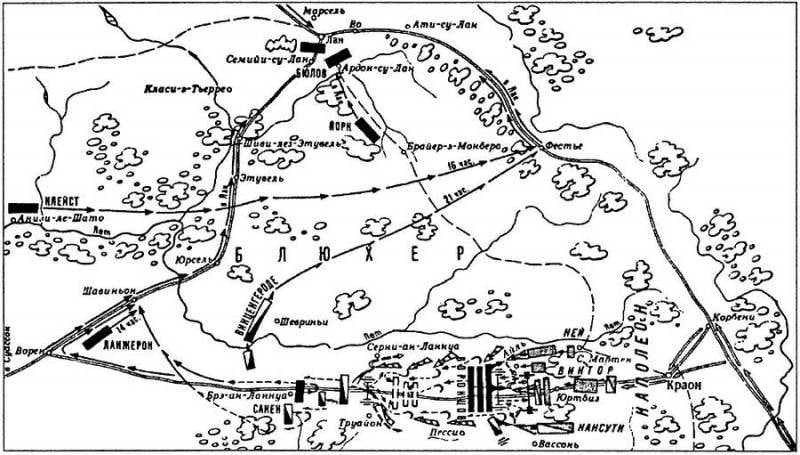
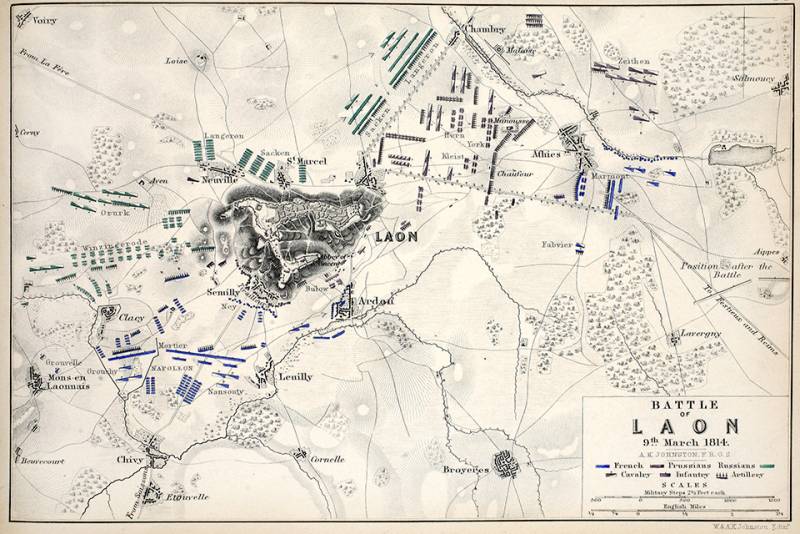
Information